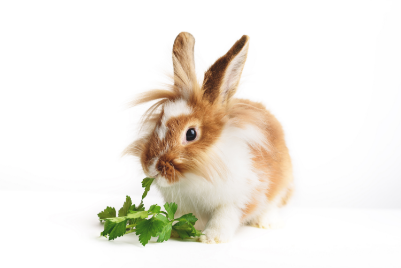Your rabbit’s diet is so important to get right. Their stomachs are very sensitive and by knowing what a healthy rabbit diet consists of you will have a happy healthy bunny.

In this section
How much should you
feed your rabbit each day
from each food group?


[adsanity align=’alignnone’ id=59]
[adsanity align=’alignnone’ id=63]
Fresh Hay
Hay is the most important food in your rabbit’s diet. Hay should smell fresh & be dust free. Never feed hay that smells musty & damp. Hay has all kinds of health benefits for your rabbit. There are lots of different hay types, so it is important to experiment and find the one your rabbit loves the most. Your rabbit should ideally eat a ball of hay the size of themselves each day.
The most popular hay types are:
- Meadow hay
- Oat hay
- Grass hay
- Timothy hay
- Readigrass.
If your rabbit has a sensitive stomach or prone to excessive cecals (cecotropes), then it would be best to stick with meadow, oat and Timothy hay. Give them Grass hay in smaller doses.
PLEASE NOTE: Alfalfa hay is very rich hay & is best given only to baby bunnies up to 1 year old and to senior rabbits over 6 years old that need to gain weight.
Which pellets?
Pellets need to consist of at least 18% of fibre to be a good quality pellet, so check the packet! One handful of pellets will feed 2 rabbits for one day, or one egg cup full is enough for one rabbit, so be careful not to over do it. Do not get worried when their bowl is empty, that is fine. If you feed them more, then chances are they will then eat less hay! The only time they could have a little more is in the winter when it is very cold or when they need to gain weight.
The most popular high-fibre pellets are:
- Science Selective
- Burgess Excel
- Oxbow Timothy
Beware of museli type feeds for the reason that nearly all bunnies will pick out bits they don’t like and this then means they are not getting all the nutrients they need each day. If you need to change your rabbit’s pellets to another make, do this gradually to avoid upsetting their stomachs. Mix a few of the new pellets in with their old ones and gradually increase the new pellets and reduce the old ones over the next few days.
[adsanity align=’alignnone’ id=63]
Vegetables & Fruit
Vegetables need to be introduced to your bunny’s diet gradually and one at a time. This will avoid upsetting their stomach and causing diarrhoea. You will also get to know quickly what your bunny likes and dislikes.
Carrots should be fed as a treat only as they are high in sugar and can cause obesity and other health problems. A piece the size of a pound coin, twice a day, is a sensible way to give as a treat.
Dark leafy veg is a favourite for most bunnies. The darker the leaves the better as they have more nutrients but don’t over do it and always offer a variety of vegetables.
PLEASE NOTE: Too much cabbage & broccoli can cause gas/bloating.
Fruit can be fed also but as a treat only as, like carrots, it is high in sugar. Fruits must be introduced slowly to avoid upsetting your rabbit’s stomach.
Popular Vegetables & Fruit
- Apple (not seeds & small treat only)
- Banana (small treat only)
- Broccoli – can cause gas, so limit
- Cabbage – can cause gas, so limit
- Carrot (small treat only)
- Carrot tops
- Celeriac
- Celery
- Chicory
- Fennel
- Green pepper
- Pear (not seeds & small treat only)
- Radish tops
- Romaine lettuce
- Rocket
- Spring greens
- Strawberry
- Watercress
Unsafe Vegetables & Fruit
- Tomato leaves
- Iceberg lettuce
- Beans
- Potatoes
- Rhubarb
Best4bunny has a more detailed Safe & Unsafe foods document available to download for free. Something for you to print off and keep to hand. The list also includes flowers and shrubs. Download it here Useful Info.


Herbs & Wild Foods
Fresh herbs
Parsley, basil and mint are some of the favourite herbs that rabbits love. Your rabbit may also like coriander, dill, rosemary, sage or thyme.
Wild foods
Foods you will find out in your garden and the countryside include dandelions, plantain, milk thistle and bramble leaves. These are all great to help with digestion.
Always make sure you know exactly what you are picking. If you’re not 100% sure what to look for don’t pick it.
Always wash foods you’ve picked in the wild as they may of been urinated on by a wild animal or sprayed with pesticides.
Dried herbs/wild foods
There are plenty of dried foods such as dried plantain or dried dandelions that you can buy for your rabbit and they will love them. They will also still get the health benefits from them that they would get from fresh herbs or wild foods.
TOP TIP: To encourage your rabbit to eat more hay or to stimulate their minds, scatter some dried herbs in amongst their hay.
For where to buy, see Best dried herbs.

[adsanity align=’alignnone’ id=63]

